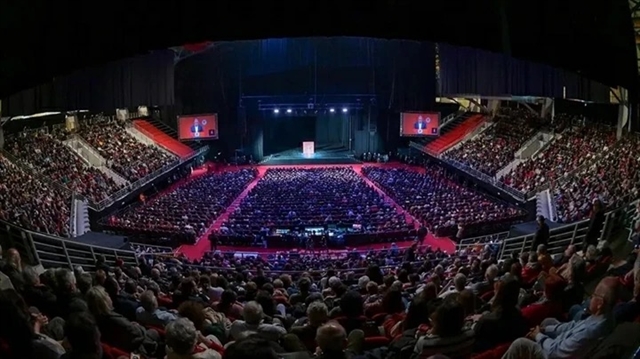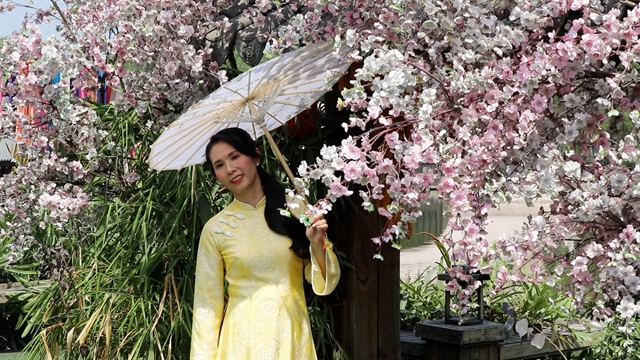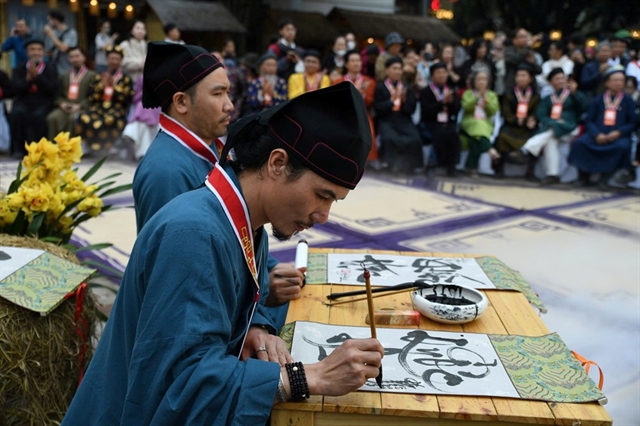 Life & Style
Life & Style

December 12 has been chosen to be Phở Day, when the national noodle soup becomes the highlight of Vietnamese people living in the country and around in the world. Việt Nam News recommends you try the delicacy of Lạng Sơn Province in Hà Nội.
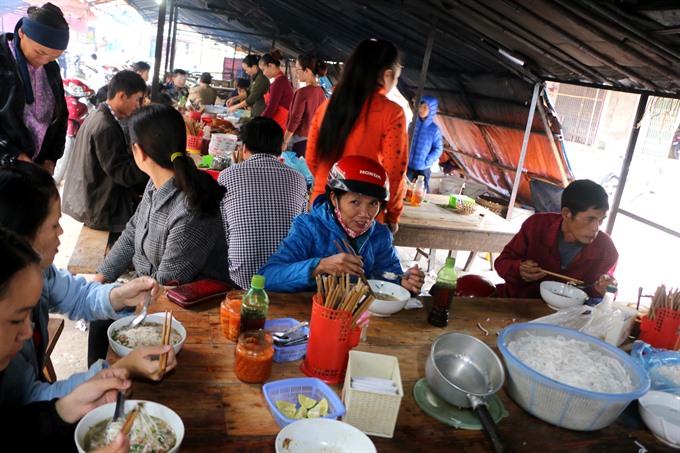 |
| Local market: In the northern mountains, the marketplace is always where the best food is served, including phở.— VNS Photo Đoàn Tùng |
By Nguyễn Mỹ Hà
Phở can be credited as the most popular soup in Việt Nam. You may have tried beef or chicken noodle soup in any city or sizeable town across the country. But phở vịt quay, or roasted duck noodle soup, has appeased the taste buds of Hanoians over the past decade.
After first starting at specialty restaurants in the suburbs, duck dishes have made their way into the heart of Hà Nội: the Old Quarter.
If you go into the area, it is hard to miss this special roasted duck noodle soup at the crossroads of Hàng Thiếc (Tin Street) and Hàng Nón (Conical Hat Street). Affordably priced at VNĐ30,000 (US$1.30) a bowl, you can opt for more meat for VNĐ40,000.
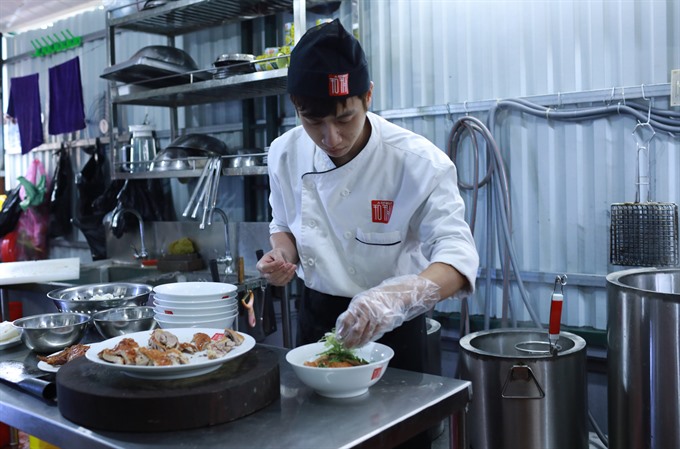 |
| Marinated: Roasted duck soaked in mắc mật leaves, Lạng Sơn style. - VNS Photo Trương Vị |
The food is quite good with flavorful broth cooked from duck bones and crucial phở spices like roasted ginger, star anise, cinnamon and black cardamom.
If you prefer better seating options, Vịt Quay Tô Thị in a townhouse on Mai Hắc Đế Street could be your best bet.
Many outlets across the city sell roasted ducks, and there is a famed duck raising village with very popular charcoal-roasted ducks called Vân Đình in the surburban Hà Tây region.
But only roasted duck from Lạng Sơn can be made into phở.
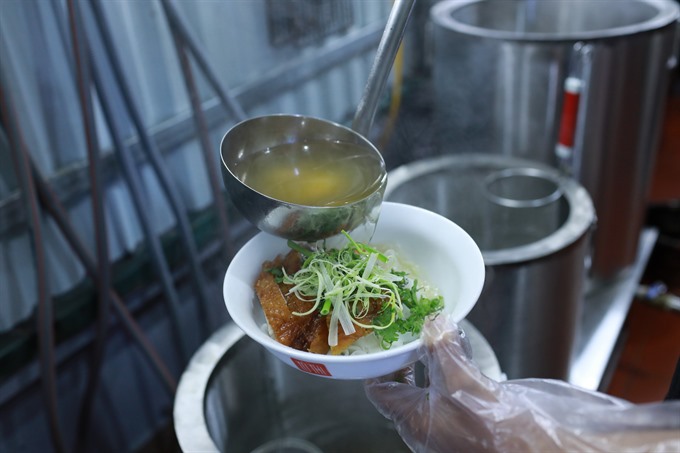 |
| Fragrant: The secret to the broth is roasted ginger, cinnamon and black cardamom. - VNS Photo Trương Vị |
Some restaurants advertise their ducks as roasted according to secret recipe from Chinese chefs, who usually keep it a tight family secret. Having tried Cantonese roasted duck, it is easy to tell the Lạng Sơn ducks may be a variation of the world famous Chinese version.
But if you look further into the ingredients and roasting methods, you soon realise the difference.
Five spices are used in the marinade for Cantonese ducks, and it is important to boil the bird in the sauce to cook it and soak up the seasoning. Some restaurants even say they keep the marinating sauce for some dozens of years. The roasting process is only to give the bird’s skin the final glaze and crispy texture.
The essential mắc mật leaves are the key to a Lạng Sơn style roasted duck.
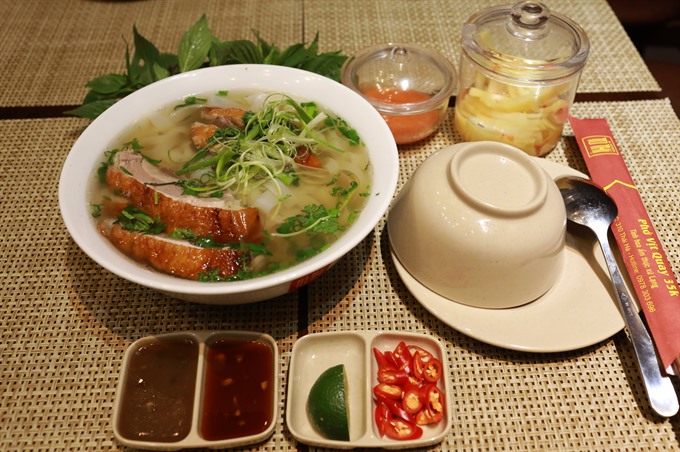 |
| Spicy sides: Dishes accompanying duck phở must include fresh sweet basil and spicy pickled bamboo. - VNS Photo Trương Vị |
Grown in the northeastern provinces of Cao Bằng, Bắc Kạn, Lạng Sơn, Tuyên Quang, Bắc Giang, Thái Nguyên and Quảng Ninh, the leaves and fruits of this lemon-family tree are known for adding flavours to roasted dishes. They survive only in these provinces. If transplanted to other climate conditions, the trees cannot survive, or else the leaves do not produce the desired flavour.
A popular cooking website recommends 22 dishes to be roasted and stir-fried with mắc mật leaves. In Tày – Nùng language, mắc mật is a sweet fruit which gives a special tangy flavour to the pickled bamboo of the greater northern mountainous regions.
The oil in the leaves can not only be a cooking spice, but it can also be distilled to make traditional medicine. Mắc mật leaves and roots can also be used as herbal medicine and for cooking purposes.
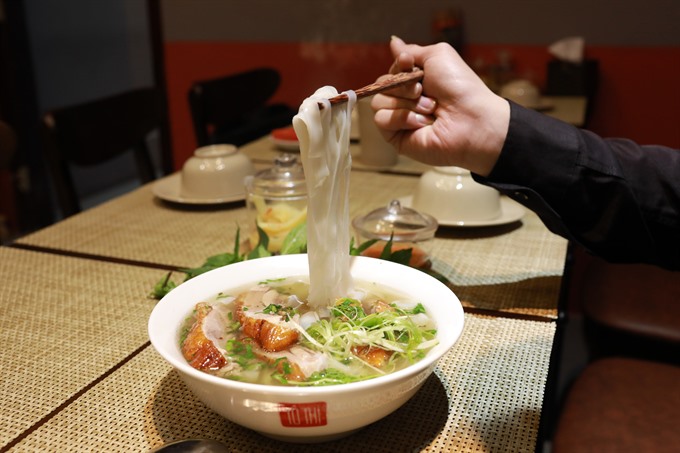 |
| Winter treat: When the cold wind sweeps through the delta, a piping hot bowl of phở is a must. - VNS Photo Trương Vị |
If you travel to the mountainous provinces of Cao Bằng, Bắc Kạn, Tuyên Quang and Lạng Sơn, you will have a chance to try phở with roasted meat like pork belly or sausage. People there have had the roasted pork or duck phở for a long time.
Đặng Ngọc Anh, 27, founder of Vịt Quay Tô Thị, said, “Mắc mật leaves are the ingredient that defines the difference between the roasted ducks of Lạng Sơn in Việt Nam and those from Guangdong or Peking. In Lạng Sơn, the leaves are added to all things roasted: pork, ducks and birds.”
Geographically, Guangdong is located on the same latitude as the northern provinces of Việt Nam. In Vietnamese the Cantonese ducks are called Vịt Quay Quảng Đông, or roasted duck Guangdong style.
Ngọc Anh is an architect by training, but he chose to start with his Vit Quay Tô Thị brand with two restaurants in Hà Nội.
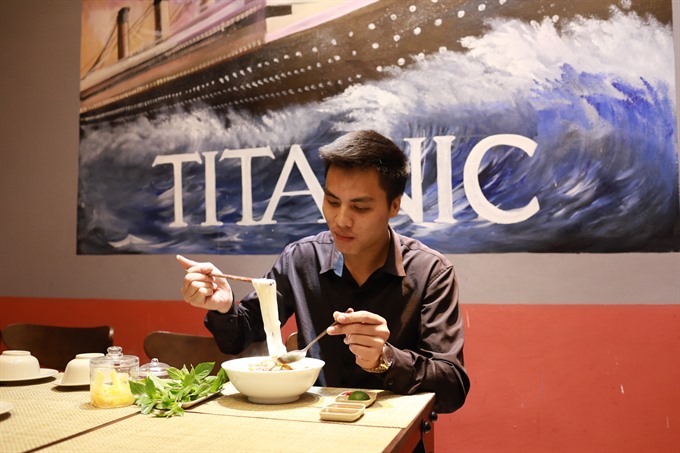 |
| Perfect mix: duck phở is hot, sour and fatty. - VNS Photo Trương Vị |
Many food enthusiasts have argued about the origins of phở, saying the beef noodle soup originated from Nam Định Province. Another writer even gave the iconic soup an an exact age of 100 years old. He wrote that phở originally derived from poached buffalo meat that wood traders used to have at the Red River Wharf. But this theory provided only the source of the meat. What about the flat rice noodles, the essential part of a bowl of phở?
I suggest the source of phở may go further upstream. In the southern provinces of China they also eat flat noodles with meat, but the noodles are made from wheat flour.
In Việt Nam, phở noodles are made from rice. They are made by steaming pancakes, the same way bánh cuốn – a popular dish of steamed rice rolls stuffed with chopped pork and mushrooms – is made.
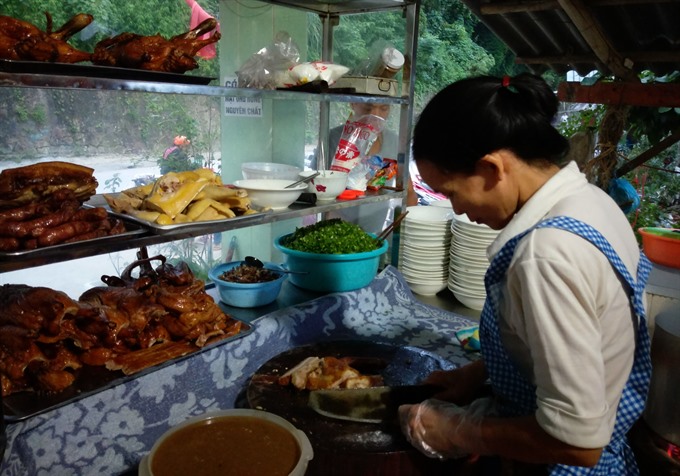 |
| Roasted: An eatery in Lạng Sơn selling roasted duck phở along with chicken phở. — VNS Photo Đoàn Tùng |
“I have not looked deeper into the origins of the roasted duck phở, but I know that phở was born a long time ago, and roasted ducks were also eaten many years ago,” Anh said. “Combining the two together, I know it has been eaten for 30 years.”
Phở with roasted duck usually has rich and fatty broth because in Lạng Sơn, the winter can become quite cold with temperatures below zero. To balance out the fatty broth, a side dish of purple basil (húng quế) and spicy pickled bamboo with mắc mật fruit is a must. This dish is never found in beef or chicken phở shops.
As part of the tradition of having phở with roasted meat, phở with roasted duck can be the highlight of this type of dish.
Any great food will eventually find its way downhill to Hà Nội. — VNS
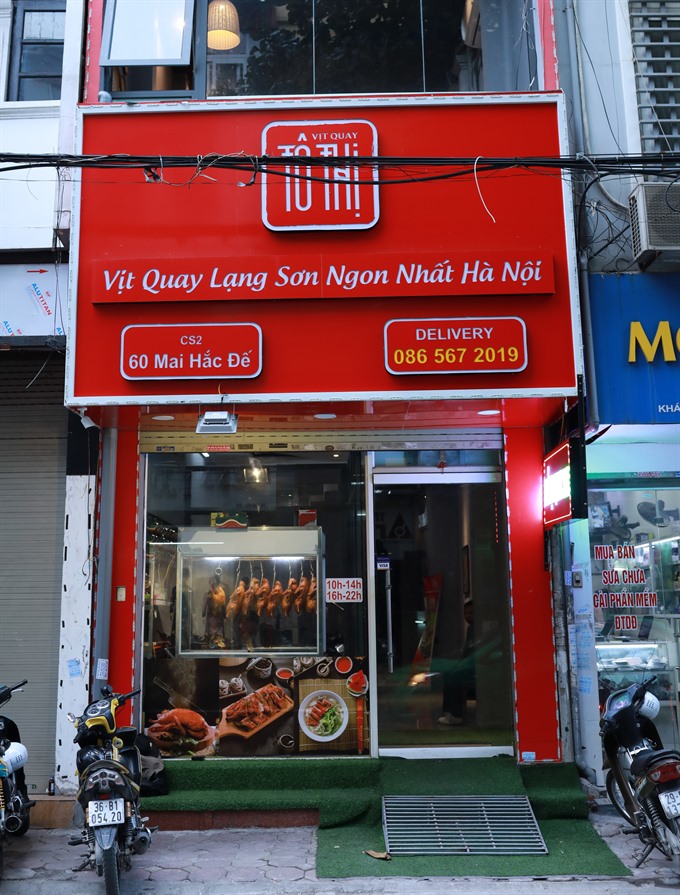 |
| Hanoi version: Vịt Quay Tô Thị offers roasted duck and phở, Lạng Sơn style. - VNS Photo Trương Vị |
Addresses:
Phở Vịt Quay: 73 Hàng Thiếc, Hàng Gai, Hoàn Kiếm, Hà Nội
No telephone available
Vịt Quay Tô thị 60 Mai Hắc Đế St., 310 Thái Hà St. for booking call: 1900-6044
Vịt quay quán Lạng
50LK6A, Nguyễn Văn Lộc, Làng Việt kiều Châu Âu, Hà Đông, Hà Nội
Tel. 097 979 71 91


